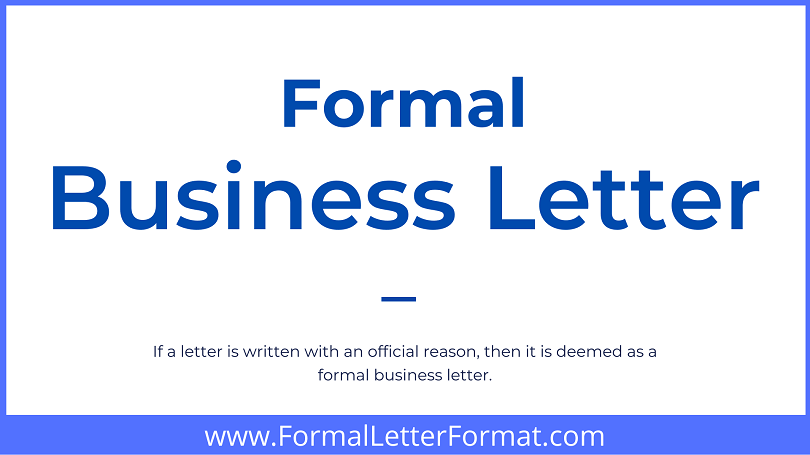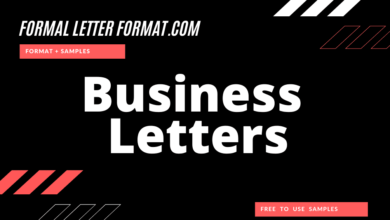Formal Business Letter Writing Guidelines – Business Letter Format, Sample and Templates
Formal Letter of Business Format, Design and Write-up instructions

The majority of us only use the informal format of writing a letter or an email. We’ve become so used to it that a structured format of a business letter is an alien concept to us. Although every business letter isn’t of a formal format, it is exclusively used when you’re writing for official purposes. A formal business letter format can be used for a job application, business correspondence letter, letter of intent, persuasive letter, sales letter, a letter of an invite, a letter of recommendation, letter to request & seek information or a letter of complaint that outlines a problem.
If a letter is written with an official reason, then it is deemed as a formal business letter.
The writing of business letters is a primary force of communicating. Through this modern communication paradigm, nations’ end objective of breaking through language, geographical, & cultural obstacles & fostering unrestricted international exchange has made a letter an important business device. With that stated, management may write business letters to staff & vice versa, as well as to partners, clients, shareholders, & consumers.
Here’s everything you need to know about a formal business letter:
The Definition of Business Letter
A formal letter is written for an official purpose. It is a form of communication that connects businesses or businesses with their employees & vice versa. Formal letters can be written to a collector, editor, manager, director or any external group. These letters are more frequently used in our regular work life. This type of letter is different than a personal one. The style of writing & the tone of the business is formal. Formal letters pay more attention to being concise & concrete. Based on the type of business letter, the tone used is variable. A business letter is usually composed of promotional activities, challenges & concerns solved, & networking.
Concerning the tone of a formal letter, the tones can range from informational, convincing, motivational or advertising. Besides, the tones rely on who’s at the receiving end. The formal letter often has an understandable direction & intention because they’re aimed at a particular individual or an audience. A formally formatted letter has become valuable for companies to communicate internally & externally.
Further, we are going to talk about its significance.
Rules of Writing a Formal Business Letters
Following are the roles served by a formal business letter & the importance as well:
-
- Operates as the delegate:
Formal letters help in delivering & communicating your message. They serve as a delegate from one organization to another. Additionally, formal letters are the cheapest form of communication compared to sending a representative to convey your message.
-
- Relevant information only:
As a formal letter expresses business issues & challenges, it just contains data that is related to your company.
-
- Serves as useful proof:
A formal letter can be kept as physical proof. It can also aid in jotting down particular transactions that can help you serve any juridical purposes in the future.
-
- Source of reference:
A formal letter can not only serve as a piece of evidence but also useful reference documentation to any potential transactions between businesses, organizations or individuals.
-
- Goodwill validation:
Should there be a written settlement involving two businesses, either in a formal letter or via an email, there is a decrease in the likelihood of conflicts between the two. Written agreements maintain harmony & hospitality among the involved parties.
-
- Encourages individuals:
A letter inspires & empowers everybody in the company to deliver efficiently.
-
- Broadens Companies:
Any entity spreads & publicizes its company whenever knowledge about goods & services is revised via a business letter distributed to clients & consumers.
Special Tips for Composing Formal Business Letters
Before composing a business letter, individual in firms plan the point or points, they have to get across to the receiver in their letter. Subsequently, writing a formal business letter means that you have to use a formal style of writing, avoiding slang & short forms. For this reason, a few guidelines are mentioned to assist you in deciding which words & sentence structures are best suited to your business letter. Here are some tips for composing a formal business letter. You must thoroughly go through the below-mentioned features:
#1. Correctness
First and foremost, all individuals writing a business letter should always be accurate in getting their message across to the receiver. To achieve this, keep the following guidelines in mind while composing your letter;
-
- You need to use the best-suited type or degree of language.
- When using facts and figures, be accurate rather than giving assumptions and approximations.
- Your writing should meet the globally accepted formal standard.
- Synchronization is mandatory. Make sure your tenses and tone are consistent.
- Bring variations in the formation of sentences. This leads to avoiding repetition and redundancy.
- You should also be careful of avoiding spelling, punctuation, grammatical and paragraphing errors. This makes the letter professional keeps the reader interested.
#2. Concise
As middle and top tier officials in an organization already have a lot of responsibilities on hand, they avoid reading prolonged emails with irrelevant information. Additionally, a mark of a good writer is that he/she can convey their message in a concise, to the point message without repetition and unnecessary details. Lengthy emails are time-consuming to type and read. Writing a message that’s is well explained as well as to the point makes sure that the receiver reads the whole message with consistent interest and grasps the point conveyed. To make sure your email is to the point, keep the following regulations in mind;
-
- Refrain from using common/overused phrases.
- Make sure your message has only facts and figures, also informing the receiver about their origin.
- Refrain from including irrelevant details, lengthy phrases, & redundancy.
- Make sure your message is not jumbled up. The points are in a logical sequence.
#3. Clarity
Clarity relates to the point you are trying to get across to the receiver. Your business email should be understandable, error-free, to the point, factual and thoughtful. A few points to incorporate all these features in your email are;
-
- Write words and phrases with meanings that you are certain of which can build interest of the reader.
- Keep a proper writing technique in mind, placing sentences in an orderly and sensible fashion.
- Make use of punctuation marks in each sentence to get your message across more clearly, in its relevant tone.
- Take the help of visuals such as graphs, tables, charts, etc. where you think it’s appropriate. This helps in conveying a clear message.
#4. Completeness
The purpose of writing a business letter or email is for you to achieve your intended outcome from it. This is achieved when your email possesses the element of completeness. To comprehend the limits of your content, you should be clear about the requirements, history, perspectives, feelings, & behaviors in mentioning the reader’s interests in the letter. The following are a few tips to make sure that your letter is compiled keeping completeness in mind;
-
- The email should cater to all the queries and confusion asked.
- Additionally, you should provide extra details to make sure the reader does not face any further confusions and all their questions are answered.
- The key achieving this is including the 5 W’s alongside the other details provided. The 5 W’s are:
-
-
- What
- Why
- When
- Who
- Where
-
#5. Concreteness
It is mandatory for a formal business letter or emails to be explicit, to the point, with complete details. A few tips to make sure your letter possesses concreteness are as follows;
-
- Your business letter must include factual information and statistics. Try refraining from using words such as soon, quick, few, etc. These words intend to eliminate the professionalism of your letter.
- Make use of action verbs portrayed in an active voice.
- Your letter must include words and phrases that create an image in the reader’s mind. For this, try to use suitable metaphors, similes, personification and figurative phrases where necessary.
#6. Consideration
Being considerate in your formal letter of business is absolutely essential. This comprises being empathic, taking the reader’s feelings into account and including a hint of human essence in your letter. Composing a letter while keeping regard of the receiver shows that you are being considerate towards them. While doing this, you should keep in mind their feelings, needs and wants, shortcomings, situation and potential repose to your letter. To incorporate consideration into your letter, here are a few guidelines;
-
- Make sure you write your letter in the first person, focusing more on the receiver than on yourself.
- Always be honest in the message that you are sending.
- Focus more on the cheerful, rather than bleak, components of your message. Use an optimistic tone in your writing.
- Make sure that your information is useful to the receiver.
#7. Courtesy
This is an essential component of composing a business letter or email. To aid this point, here’s a saying, “Everyone gains where courtesy regains”. When writing a business letter, adding a touch of courtesy can go a long way and prove to be more fruitful than you can imagine. Extending any form of courtesy in your writing can help build a bond between you and the reader, even turning a business relationship to an acquaintanceship. To include a courteous touch to your business letter, go through the following guidelines;
-
- You should be very considerate, regardful and pensive in your writing.
- Refrain from using sentences/phrases that can cause anxiety, animosity, problems and feuds between you and the receiver.
- Make sure to reply to your emails punctually/on time.
- If you make a mistake, own you to it & say sorry in a regretful tone. Don’t make excuses or forcefully defend yourself.
In our daily routine, we may be courteous all the time but when times are tough, we may act without thinking and totally forget to be considerate. So under such circumstances, you should try as hard as you can to not lose your temper and act/write in a decent manner. Because in the end, these little things are the key to creating bonds in business.
#8. Confident Writeup
Sounding confident in a formal business letter is a must. Displaying confidence through a letter implies using a positive approach to omit troubling concerns. Trust often produces a constructive atmosphere in communications. Trust in the letter is visible when you have faith in yourself. However, the right amount of confidence needs to be kept in mind as you don’t want to sound overconfident.
Besides the aforementioned aspects of being confident, it is essential to convey positivity, definitiveness, clarity, assurance & straightforwardness. You must refrain from sounding uncertain & showing a lack of confidence. For example, steering clear of phrases like, ‘I trust…’, ‘I hope…’, ‘Why not…’ or ‘Let’s get on with…’ Alternatively, utilize & develop such sentences that serve the purpose of writing the letter.
#9. Conversational Tone
When the recipient reads the letter, they must feel like they’re having a face-to-face conversation. The tone must remain unobtrusive, modest, neutral & comfortable. The letter should not sound or look like an essay. It is a major ‘don’t’ to add slangs to your business letter as well as legalese. Following are some tips to help you compose a conversational & a professional letter of business:
-
- Utilize quality but comprehendible vocabulary.
- Using correct syntax.
- You have to sound polite, direct, & honest.
- You have to sound professional.
- The paragraphs must be kept as short as possible.
- You should stop using ambiguous prose, as well.
Instructions for Writing a Formal Business Letter
Regardless of the technological advancements, the formal letters necessity will never vanish. A formal business letter reflects one party’s formal message to another. Following a roadmap is given for you to follow:
-
- To begin with, you’ll start with the essential details. You must write your business’s name, contact details & address. It is written on the top right side.
- Then you will write the date i.e. on the right side.
- On the left side, you will now mention the recipient’s address.
- Use the correct greeting.
- Add the subject of the letter.
- Following that, you will start by writing the body with clarity. Utilize appropriate pronouns, tone, & active voice. Be polite & courteous.
- Conclude your letter with a complimentary closing. For example, ‘Yours Faithfully’.
- Sign off your letter with your name & the department you belong to.
- In case there are any enclosures, then attach those.
- Proofread a couple of times in order to avoid mistakes.
Templates are available to help you write a formal business letter.
Instructions on Composing a Business Email Format
A modern version of a letter is an email. Over the time of changes in technology, formal emails have become more of a replacement for letters.
Emails can be swiftly sent, they are a refined & advance version of a letter. Whereas, letters are time- consuming. They need to be physically delivered by post & the sender has to wait for the recipient to receive it as well. Following is a short & easy direction for you to compose a business email:
-
- For starters, always send a business email via a business email. Remember to keep your personal email address separate from your business email address.
- Add a correct & concise heading in the subject area. It should relate to the content of the letter.
- Just like a letter, use salutations.
- The introductory paragraph must be utilized to familiarize yourself with the recipient if need be.
- Now the intended message must be stated in the second paragraph.
- End the email with a concluding paragraph. The closing line should be decent. Utilize ‘yours cordially’ or ‘yours sincerely’.
- The last step is to proofread the message at least twice in order to eliminate grammatical mistakes & misspellings.



